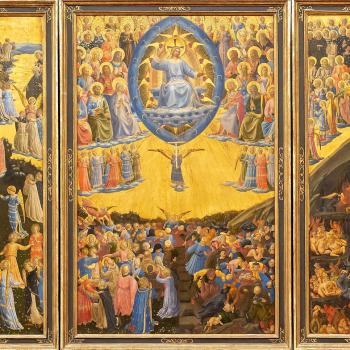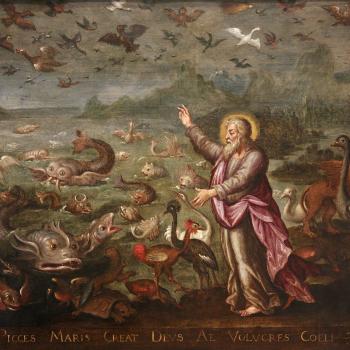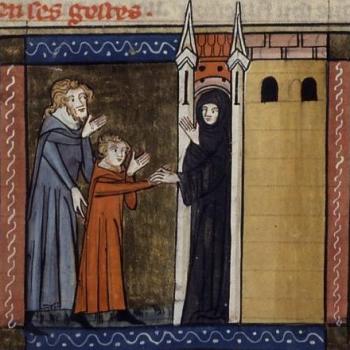
Eschatology can be difficult to dealt with because those who write on eschatological themes, though using the same words, often mean and are discussing different things with those words. Even what is meant by the word eschatology differs from person to person: some use it to discuss the end of the world, while others use it to explain what happens at the end of life. Of course, the two are connected, and some theologians make that connection more explicit than others, but many will not, leading to people come to their writings with the wrong expectations and the wrong hermeneutical lens.
We can observe this when we talk about matters of salvation. How many people will be saved? What exactly does it mean to be saved? Different theologians will give different answers to these questions. Some, perhaps a few, say everyone will be saved; most will say some will be saved, and no one seems to suggest the answer is no one. But what do they mean by this? Different writers will mean different things when they talk about salvation so that those who say all will be saved might actually be in agreement with those who say some will be saved. For example, if salvation is the restoration of the dead to life, it is possible to say everyone will be saved because of the universal resurrection of the dead. Even those who believe not everyone will be saved will believe in the universal resurrection of the dead, but they will say that among those who rise, some will be resurrected into eternal glory and perpetual theosis, while others are for some sort of limited glory (without such theosis). They would then say that those who rise to some sort of limited glory, with no theosis or union with God, would be whose who are not “saved.”[1] Thus, when reading particular authors and their discussion of salvation, it is important to consider what it is they are talking about: is it the objective restoration of what is lost due to sin, or is it something subjective, something that allows for resistance to beatitude? Not everyone will give the same answer.
Likewise, it can be asked, when exactly will someone be saved, if they are saved; is it in their temporal life? Does it happen at the point of death? Or will people have to experience something after their death, go through some sort of purification process, before they can be said to be saved? Will everyone who is saved experience the same level of beatitude? These questions can be asked not only for those who believe only some will be saved, but also for those who believe all will be saved. This means, if someone believes all will be saved, they could still believe there is a process to salvation, and the more evil someone has done in life, the longer and more difficult the process would be, demonstrating that belief in universal salvation does not have to render earthly life insignificant.
Another question which can be asked is whether or not someone, once they are saved, once they are beatified, can, for some reason or another, renounce their salvation? Once again, for anyone willing to answer this question, they must first make a definition of what salvation is, so that they can then explain why or why not it can be lost. Traditionally, the answer most have given to this question is in the negative, with only a few who suggest such a fall from beatitude is possible. And if it is possible, it must be asked, when? Is it a temporary possibility or a perpetual one?
Is salvation ontological, indicating some sort of change in the person who is saved, or is it merely imputed? If it is imputed, is it imputed because of something someone has done, such as asking for salvation, or is it imputed to them based upon nothing which they have done? And if it is not based upon anything that they have done, and not everyone will be saved, what does this tell us about God?
These questions are what someone needs to ask themselves when presenting their own eschatological beliefs because then they can better present them, making them less likely they will be misunderstood. Nonetheless, it is possible for someone to think that we can’t answer all eschatological questions before we experience the eschaton for ourselves. This was the position of Hans urs Von Balthasar in regards the number of the saved. He taught that we cannot know the answer until it is revealed to us when we encounter Jesus in the judgment seat of God. In this regard, he followed many, like St. Isidore of Seville, who said:
Even though the conduct of the just in this life may be worthy of approval, it is still uncertain for humans to know what end they are predestined. All things are reserved to the future judgment.[2]
It is, because of this ignorance, Balthasar said we can, and out of the goodness of our heart, should hope that all will be saved. But what does he mean by this? Is it just the restoration of all people to life? No; it is more than that, it is the hope that everyone will experience the glory of those who participate in the divine life, experiencing and receiving the grace of God for beatitude, or eternal happiness. In regards the question about salvation and if it includes an ontological change, the answer is yes, and with it, a change for the better, through a process by which all that was tainted by sin is excised from those who are saved so that they can come through and emerge completely untainted. The process itself happens at the last judgment, before the throne of God, where a person has to be presented with their sin, comes to understand why it must be condemned, and accepts that condemnation and the grace which comes afterward, grace which then can perfect what was harmed by sin. In this way, even if everyone ends up being saved, which Balthasar cannot say would happen, it would not be an easy process, and the greater the sin, the harder and longer the process will seem to take, which is why what is done in life plays an important role in the process of salvation. Once someone has accepted the judgment and received grace, they will know and understand the problem of sin, so they will not turn back to it; there is, with Balthasar, no turning back away from salvation once it has been attained.
Now, many would criticize Balthasar’s answer, for many different reasons. There are those who think his hope does not give God enough credit, that God, who desires all will be saved, will find a way to make it happen. Others think that it is impossible for all to be saved because Scripture indicates in the last judgment, some will be saved and some will be condemned. To the first point, Balthasar would challenge them through the question of free will: if it is a necessity that all will be saved, then the will and its freedom would appear to be lost, which would raise many other philosophical and theological questions. On the other hand, for those who think they know at least some, if not many, will perish based upon their reading of Scripture, Balthasar would remind them that such prophecies in Scripture tend to be conditional and we do not know if the conditions which would lead to such a conclusion would actually be met; plus, he would show various passages which seem to indicate that all will be saved, as Scripture says in the end God will be all in all.
Balthasar’s position is, to be sure, not the only one which can be taken; theologians have given many different answers to each of the questions, sometimes finding their answer officially rejected by the Christian community as heresy. The church does allow for a variety of answers. It does not require one to believe most of humanity will be damned, though it does allow some to believe such an answer, even as it allows others to hope that most, if not all, will be saved. Nonetheless, it is not just what is possible, but the reasons for what is possible, which need to be investigated: if God damns most of humanity because he hates humanity, that would be an unacceptable position, just as it would be wrong to suggest he saves everyone because he has no concern of the character of the saved. It must be clear, in whatever answer one gives, that sin is a serious concern for God, even as God granting salvation must be seen as coming out of God’s greater love for his creation. Justice and mercy must both be accounted for in any consideration for the eschatological fate of humanity as a whole.
Eschatology can be fascinating. Different writers look at eschatological questions differently. Sometimes, it is clear when they contradict each other, sometimes not, because of various possible equivocations involved. It is important to understand each theologian in their own terms, to figure out what they mean, to make sure their position is not misunderstood. It is not always an easy task. But it is an important one if we want to have a proper discussion on what we can expect, or at least hope for, in the eschaton.
[1] These are not the only options available to us. It is possible for some to think not everyone will rise from the dead, that some die and perish, never to come back to life. Or it is possible to believe that everyone will come back to life, but some will once again die and perish, never to return to life if they do.
[2] St. Isidore of Seville, Sententiae. Trans. Thomas L. Knoebel (New York: Newman Press, 2018), 91.
Stay in touch! Like A Little Bit of Nothing on Facebook.
If you have liked what you read, please consider sharing it with your friends and family!











